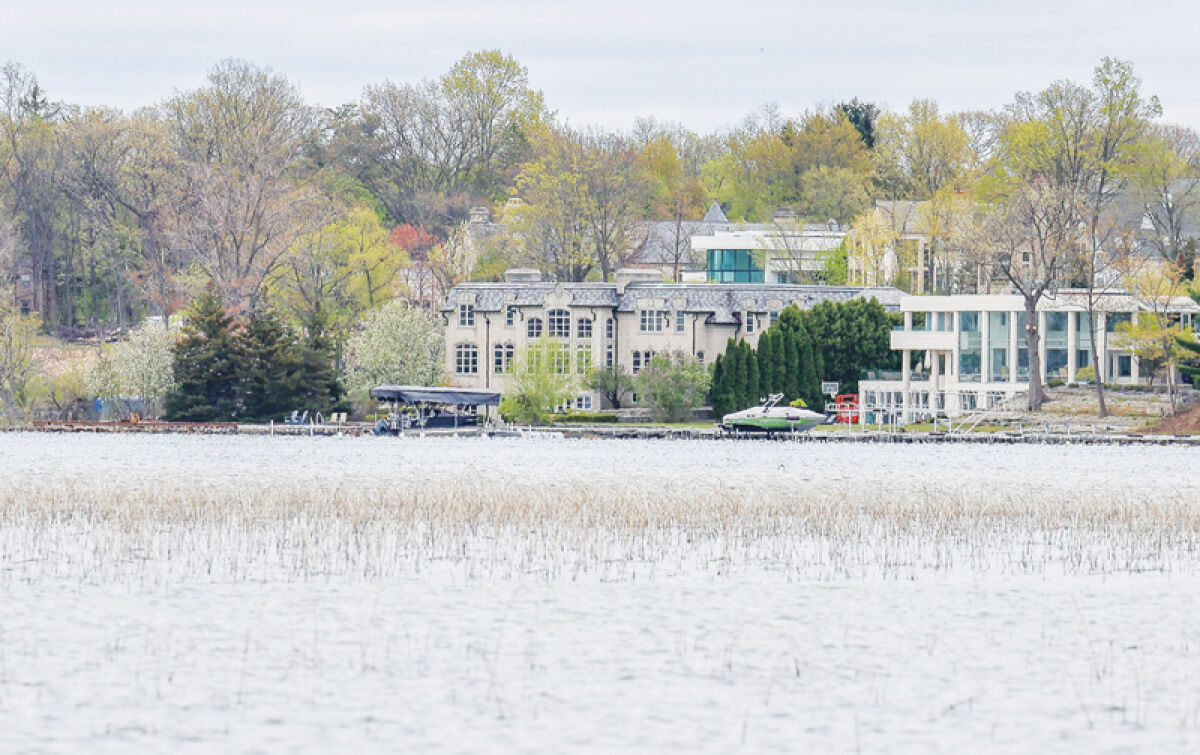
Water levels are high in the spring but can drop by as much as 2 feet in the summer heat.
Photo by Patricia O’Blenes
WEST BLOOMFIELD/ORCHARD LAKE — The Upper Straits Clean Lake Association, in cooperation with the Oakland County Water Resources Commissioner, is appealing the Michigan Department of Environment, Great Lakes and Energy’s denial of a request for an augmentation well that would help maintain court-ordered water levels on Upper Straits Lake.
In the 1960s, it was determined in Oakland County Circuit Court that Upper Straits Lake’s water level should be kept at nearly 931 feet above sea level. Since then, weekly water level readings have been published by the Drain Commission.
The lake extends from West Bloomfield Township to Orchard Lake Village, with homes on 223 parcels, valued collectively at more than $750 million.
According to Teri Weingarden, a West Bloomfield trustee and the board’s treasurer, residents are concerned about the falling water level because it could diminish home values, recreational use of the lake and the overall health of the ecosystem.
David Silver is president of the Upper Straits Clean Lake Association, which monitors the lake. Silver said that he has seen lake levels drop as much as 2 feet during hot summers.
“When the lake levels drop like that, (residents) can’t even get their boat off the hoist in some of the locations,” he said. “People run aground halfway across the lake, including myself.”
When lake levels drop, there is also an increase of weeds and biomass, he said.
An augmentation well is a structure that would supply water to the lake to maintain levels. The water for the well would be supplied by an aquifer accessed by drilling deep into the ground.
Aquifers are underground channels of water that run all over the earth. According to Silver, this method is widely used for augmentation wells throughout Michigan.
Being connected to an aquifer is nothing new for those on Upper Straits Lake.
“Many of us are not connected to city water, so we drill a well with a permit from the county and we hit an aquifer,” Silver said.
The aquifer for the lake would be bigger and deeper than the ones for home use.
The Water Resources Commissioner submitted a permit application to EGLE on behalf of the USCLA in May 2024. It was denied in January 2025, at which point the WRC filed a petition for a contested case hearing.
“The WRC does not comment on pending litigation, but remains committed to addressing residents’ concerns related to the lake level of Upper Straits Lake, and working with the state to find a resolution,” Water Resources Commissioner Jim Nash said in a written statement.
The West Bloomfield Beacon contacted EGLE about the permit denial. A spokesperson for EGLE declined to comment, instead pointing to previous postings.
In a letter from EGLE to the WRC, dated Jan. 15, 2025, the department described its reasons for denying the permit.
“The proposed project is not in the public interest, in that it will have significant secondary adverse effects on the natural resources associated with Upper Straits Lake,” the letter reads.
According to EGLE, one concern is the impact on nearshore and wetland habitats. Stabilizing water levels would inundate portions of the shoreline that would otherwise be dewatered seasonally, the letter states.
“The adverse impacts that would result from the proposed activities are not commensurate with the public or private need for the augmentation,” the letter concludes.
EGLE also suggested dredging the lake and extending the boat docks as feasible solutions. Dredging is digging out the bottom of the lake. Critics say it would be ineffective, and that extending the docks would be a navigational hazard for boats, especially at night.
Neither Weingarden nor Silver see the suggestions as reasonable.
“There have been other cases in the state where communities have gone to court and fought for an augmentation well … and they have won,” Weingarden said. “(The USCLA’s) goal is not to be in court, but to come up with reasonable solutions.”
Local governments also support the request for an augmentation well.
Both West Bloomfield Township and Orchard Lake Village have adopted resolutions in support of an augmentation well.
“What we’re saying is, we as governmental entities, we wish (EGLE) would reconsider this application for an augmentation well for our residents,” said Gerry McCallum, the city manager of Orchard Lake.
For the USCLA, the engineering studies, drilling and legal fees have surpassed $100,000, Silver said. This is paid by the residents of the lake.
“We’ll continue to fight because we know that we’re on the right side of this, especially from an environmental standpoint,” Silver said. “We’re passionate about maintaining this beautiful body of water for decades to come.”
 Publication select ▼
Publication select ▼





























